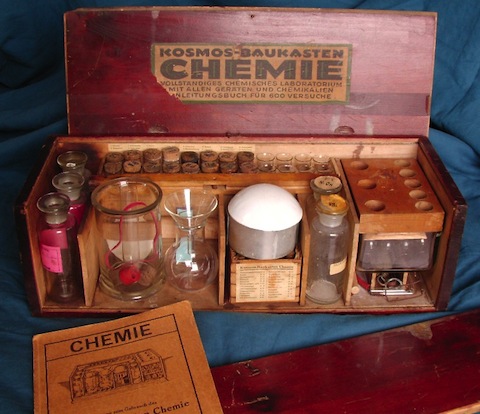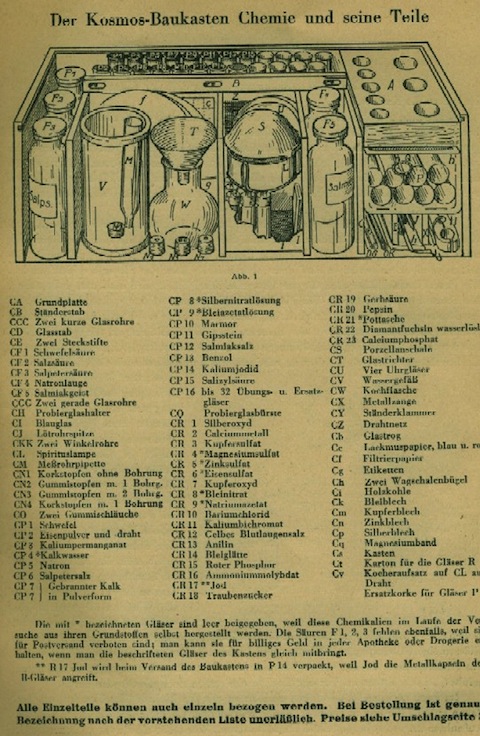Lamentations about the disappearance of classical “science kits” appear on the media every few years. Recently, the New York Times, Boing Boing and others wrote about it.
A chemistry kit from Kosmos (a German company that still makes them) was one of several my parents gave me, and I used it intensively for several years. Here’s a picture of the kit itself:
 and here’s a list of the contents (in German):
and here’s a list of the contents (in German):
 (both pictures are courtesy of Hugo Rune). Several compounds, notably sulfuric acid, nitric acid and hydrochloric acid, were not sold with the kit – for safety reasons – and my father obtained them at his company. I soon learned that there were a few chemical supply houses in town, where I could buy extra test tubes, glass and rubber tubing, and replacement chemicals.
(both pictures are courtesy of Hugo Rune). Several compounds, notably sulfuric acid, nitric acid and hydrochloric acid, were not sold with the kit – for safety reasons – and my father obtained them at his company. I soon learned that there were a few chemical supply houses in town, where I could buy extra test tubes, glass and rubber tubing, and replacement chemicals.
As far as “safety reasons” go, I believe that almost none of those chemicals would be allowed today. To quote one manufacturer of modern kits (from the New York Times piece):
Basically, you have to be able to eat everything in the science kit.
I suppose that for today’s kids, with their nanosecond attention spans, atrophied self-preservation instincts and parents who sue anybody at the drop of a hat, these precautions are necessary. For myself, I was used to seeing my father handle dangerous tools and substances in his workshop, and although I had a few scares with exploding reagents, nothing serious happened. For a few years – until I discovered that there were actual computers available outside of science-fiction books – I even thought I would pursue chemistry as a career.
Even so, this kit was extremely important and life-changing for me. At the time, my father still smoked occasionally – this was in the early 1960s. My kit included a simple glass aspirator pump (it’s not on the above parts list, for some reason), and I noticed that one of the glass tubes had a flared end that was the exact fit for a cigarette. I hooked the pump up to most of my glass tubes and soon had a primitive cigarette-smoking machine. The pump vacuum was strong enough that a lighted cigarette was smoked down to a nub in less than a minute! But the most impressive result was that the tubes were completely clogged with a black, foul-smelling, viscous substance.
Cleaning the tar out of my precious tubes made me strongly resolve to never start smoking in any form, and I think that my father stopped smoking very soon after seeing the results of that experiment. Maybe some educator should consider selling such smoking machine kits; the episode was certainly decisive for me.
I also fondly recall several other science/engineering kits from my childhood. My chemistry kit, unfortunately, no longer exists, but I still have the Märklin Metallbaukasten I got at the age of 3 (and even use it now and then)! I also had a Lectron Elektronik kit, several other electronic kits from Brazilian companies (Heathkits were, unfortunately, unavailable), and uncountable puzzles and educational games. We also subscribed to several magazines about such subjects.
In retrospect, I’m extremely grateful to my parents in making these and other materials available to me under difficult circumstances.
Update: just found a scholarly paper by Daniel Wolf about science kits (in German); very interesting.
